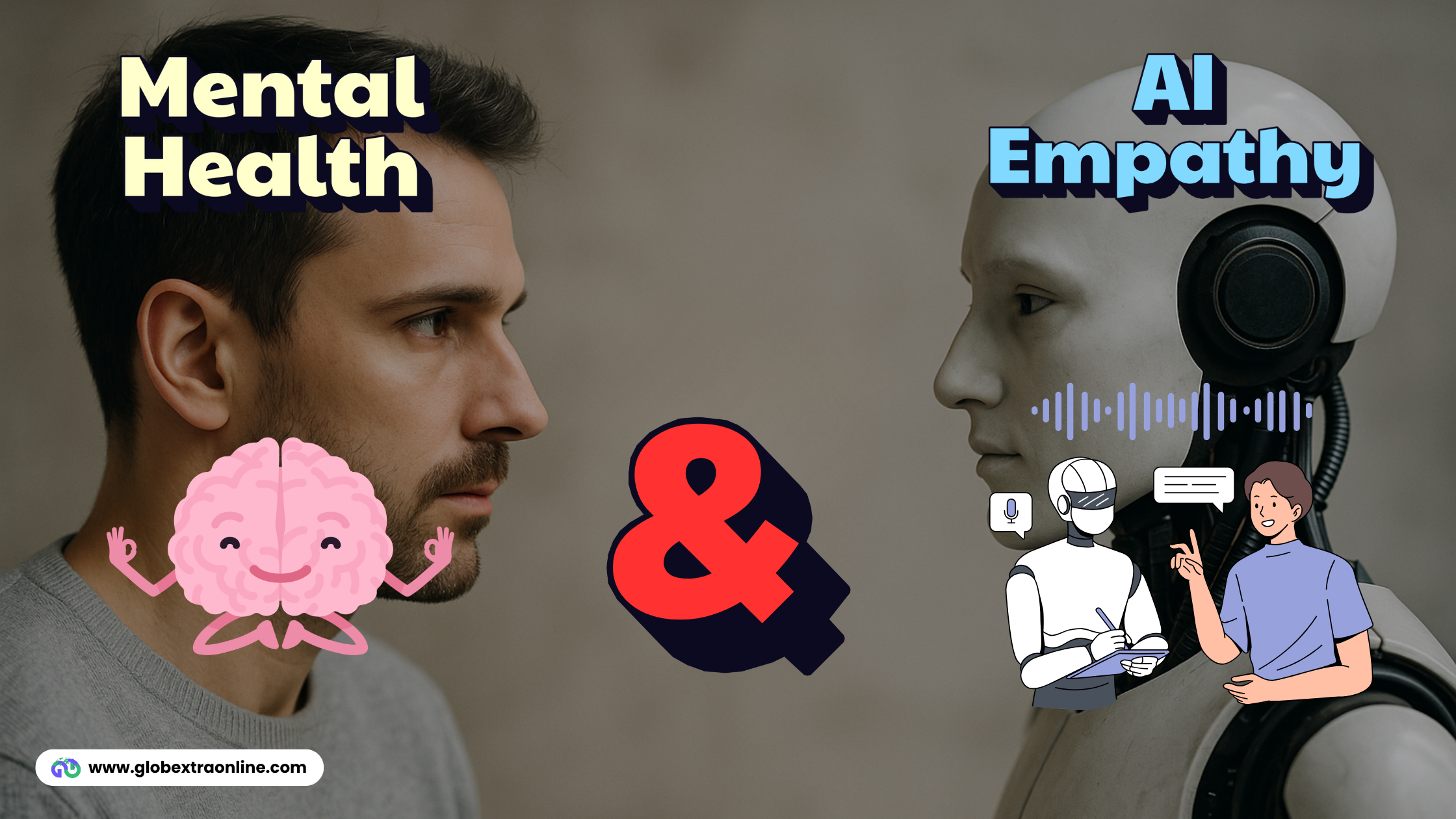Are you curious about the connection between Mental Health & AI Empathy? In this blog, we will reveal 11 eye-opening facts about how artificial empathy reshapes emotional support.
We at Globextra bring you another blog in our mental health series, and we hope you find it meaningful.

Mental Health & AI Empathy- 11 Facts That Cannot Be Ruled Out
Mental health is becoming an increasing concern, and doctors are constantly seeking innovative solutions that aid in treatment and create a lasting impact on patients’ lives. One emerging contender in this space is artificial empathy(AE).
But how far can AI go in mirroring human empathy? Can it truly “feel,” or does it just mirror human emotions? In this blog, we uncover 11 mind-boggling facts that will challenge what you think about mental health and artificial empathy. Ready to dive in?
1. What Is Artificial Empathy- The Term Explained
Artificial Empathy (AE) is the method used by AI systems to recognize, interpret, and respond to human emotions. Unlike human empathy, which is based on personal experience and emotional connections, artificial empathy relies on complex information, machine learning, and natural language processing to imitate emotional understanding.
2. Can AI Feel Emotions- An Important Point To Know For Better Understanding When Discussing Mental Health & AI Empathy
AI can analyze, recognize, and respond to emotions based on data patterns, facial expressions, tone of voice, and texts. This is commonly called Artificial Empathy (AE) or Affective Computing. However, as AI is devoid of consciousness, the ability of self-awareness, or personal experiences, it cannot feel emotions like Humans.
3. AI’s Blind Spot- The Lesser Known Fact That Deserves A Mention When We Talk About Mental Health & AI Empathy
AI’s blind spot refers to areas where artificial intelligence fails to perform effectively. These can be due to limitations in data, biases in training, ethical concerns, or the inability to handle complex human emotions and creativity. Some key blind spots are listed below.
- Lack of Common Sense
- Bias in Training Data
- Understanding Context and Emotion
- Creativity and Original Thought
- Ethical and Moral Judgment
- Adapting to New and Unseen Situations
- Security and Privacy Risks
4. Knowing If An AI That Understands Mental Health Is Worth Exploring And Which Is An Important Factor In Mental Health & AI Empathy
AI is currently used in mental health to provide support, detect early warning signs, and even assist therapists. We can say that AI for mental health does exist, and we are going to learn about some ways in which AIs are used in the mental health sector.
- AI Chatbots for Therapy & Support
- AI-Powered Diagnosis & Monitoring
- AI for Therapists & Research
5. What Is The Connection Between Empathy And Mental Health?
Empathy plays a crucial role when it comes to mental health as it directly influences both emotional well-being and social connections. Let us see some more ways through which emotions can be linked with mental health below.
-
- Empathy helps people connect, thereby reducing the feeling of loneliness and isolation.
- Helps to understand others’ emotions, which in turn paves the way to being more aware of their feelings.
- Empathetic people are more likely to seek and provide emotional support, which is crucial for mental health.
- Showing kindness releases oxytocin, which lowers stress levels.
- Empathy allows people to express and share emotions, preventing emotional suppression.
- Improves communication and reduces misunderstandings, leading to lower anxiety in social interactions.
6. What Is Emotional Intelligence In The Age Of AI?
Emotional intelligence refers to the human ability to understand, manage, and respond to emotions- and is the factor that sets AI and humans apart. The unique human qualities like empathy, intuition, and complex social interaction possessed by humans- a virtue that machines cannot replicate. As AI continues to evolve, emotional intelligence remains a powerful human advantage.
The ability to understand and connect with emotions is what makes us uniquely human—and irreplaceable in a world driven by technology.
7. What Is Aimpathy When We Talk About Mental Health & AI Empathy?
Let us learn a new word in this section called “AIMPATHY”.
As AI continues to evolve, a new concept—Aimpathy has been coined. This is nothing but a combination of AI and empathy and refers to the ability of machines to simulate emotional intelligence by recognizing and responding to human feelings in an empathetic manner. This is what is meant by AIMPATHY.
8. Considering Some Examples of Emotional AI In The Mental Health Sector
Emotional AI, Emotional Quotient(EQ), and Affective Computing are some terms associated with AI empathy. Let us see some AIs that are used in the mental health sector in this section.
Woebot
Wysa
Replika
Mindstrong
IBM Watson Health
Facebook’s AI Suicide Prevention Tool
Ginger
9. The Importance Of Emotional Intelligence In The Age Of AI When It Comes To Mental Health
Let us see some important factors in determining the importance of emotional intelligence in this section.
- Provide 24/7 emotional support through conversations.
- Detects early signs of mental health conditions via voice and facial analysis.
- Identifies suicidal tendencies in posts and messages.
- AI-driven mental health platforms that assist therapists.
10. Role Of AI In The Mental Health Sector: An Important Aspect To Consider
AI plays a critical role in various aspects of mental health care, including early detection, therapy support, crisis intervention, personalized treatment, etc. Let us see some of them below. Must know: A few have been mentioned earlier in the blog, and in this section, we have mentioned their usage. So, let us see what they are and how they are helping mental health doctors.
- AI for Early Detection of Mental Health Conditions
AI can analyze speech patterns, facial expressions, and online behavior. This helps doctors to detect early signs of mental health issues like depression, anxiety, PTSD, and suicidal thoughts. Some names to know are.
- Ellie (by USC Institute for Creative Technologies) – An AI-powered virtual therapist that detects depression and PTSD through voice and facial expression analysis.
- Mindstrong – Uses smartphone behavior analysis to predict mental health issues.
- AI-Powered Chatbots for Mental Health Support
AI-driven chatbots provide 24/7 emotional support and therapy-like interactions thus making mental health care more accessible. We have mentioned some names below.
- Woebot – A chatbot using Cognitive Behavioral Therapy (CBT) techniques to help with anxiety and depression.
- Wysa – An AI chatbot that offers guided meditation, mood tracking, and self-help exercises.
- Replika – An AI companion that engages in deep, meaningful conversations to support mental well-being.
- AI in Suicide Prevention & Crisis Intervention
AI systems can analyze social media posts, text messages, and online behavior to detect warning signs of suicidal ideation or distress. This warns mental health practitioners beforehand. Some names are listed below.
- Crisis Text Line AI – Identifies high-risk messages and prioritizes them for human counselors.
- Facebook’s AI Suicide Prevention Tool – Uses machine learning to detect posts with suicidal intent and alerts crisis teams.
- Koko AI – A peer-support platform that provides AI-assisted mental health guidance.
- AI in Personalized Therapy & Treatment Plans
AI is making therapy more data-driven and customized & thus helping professionals make treatment more personal based on patients’ history, behavior, and progress. Some AI tools that are helping doctors are mentioned below.
- Ginger – An AI-powered mental health coaching platform that customizes treatment for individuals.
- X2AI (Tess) – An AI chatbot providing emotional support in multiple languages, complementing human therapists.
- IBM Watson Health – Uses AI to analyze medical records and identify mental health trends for better treatment plans.
11. What Is The Future Of AI In The Mental Health Sector?
Researchers are actively working toward developing AI systems that can accurately identify mental health issues. Modern-day AIs can analyze speech patterns to help detect depression or anxiety, and in the future, they might be able to predict psychiatric cases before they occur. So, we can say that it is potentially enabling consistent monitoring of a person’s mental well-being and adapting accordingly.
This concludes our blog, and we hope you have an idea about mental health and AI empathy. Should you need to ask us questions or just be heard, we can be reached through our website.
Remember that it is okay to seek support to be emotionally happy!!!

Leave a Reply